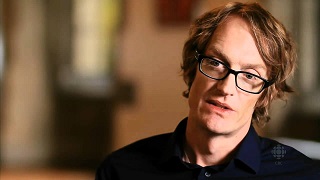De Canadese schrijver en scenarist Patrick deWitt werd geboren op 6 maart 1975 op Vancouver Island. Zijn eerste boek “Ablutions” (2009) werd uitgeroepen tot New York Times Editor’’s Choice boek. Zijn tweede boek,” The Sisters Brothers” (2011) werd genomineerd voor de Man Booker Prize 2011, de 2011 Scotiabank Giller Prize, de Rogers Writers’ Trust Fiction Prize en de Governor General’s Award for English language fiction. Patrick deWitt was één van de twee Canadese schrijvers, naast Esi Edugyan, die in 2011 de lijst van alle vier de orijzen haalde. In 2011 werd hij wel de winnaar van de Rogers Prize en de Governor General’s Award for English language fiction. In 2012 kreeg hij voor “The Sisters Brothers” de Stephen Leacock Award. Zijn derde roman “Undermajordomo Minor” werd gepubliceerd in 2015. Patrick deWittwoont momenteel in Portland, Oregon.
Uit: The Sisters Brothers
“I was sitting outside the Commodore’s mansion, waiting for my brother Charlie to come out with news of the job. It was threatening to snow and I was cold and for want of something to do I studied Charlie’s new horse, Nimble. My new horse was called Tub. We did not believe in naming horses but they were given to us as partial payment for the last job with the names intact, so that was that. Our unnamed previous horses had been immolated, so it was not as though we did not need these new ones but I felt we should have been given money to purchase horses of our own choosing, horses without histories and habits and names they expected to be addressed by. I was very fond of my previous horse and lately had been experiencing visions while I slept of his death, his kicking, burning legs, his hot-popping eyeballs. He could cover sixty miles in a day like a gust of wind and I never laid a hand on him except to stroke him or clean him, and I tried not to think of him burning up in that barn but if the vision arrived uninvited how was I to guard against it? Tub was a healthy enough animal but would have been better suited to some other, less ambitious owner. He was portly and low-backed and could not travel more than fifty miles in a day. I was often forced to whip him, which some men do not mind doing and which in fact some enjoy doing, but which I did not like to do; and afterward he, Tub, believed me cruel and thought to himself, Sad life, sad life.
I felt a weight of eyes on me and looked away from Nimble. Charlie was gazing down from the upper-story window, holding up five fingers. I did not respond and he distorted his face to make me smile; when I did not smile his expression fell slack and he moved backward, out of view. He had seen me watching his horse, I knew. The morning before I had suggested we sell Tub and go halves on a new horse and he had agreed this was fair but then later, over lunch, he had said we should put it off until the new job was completed, which did not make sense because the problem with Tub was that he would impede the job, so would it not be best to replace him prior to? Charlie had a slick of food grease in his mustache and he said, ‘After the job is best, Eli.’ He had no complaints with Nimble, who was as good or better than his previous horse, unnamed, but then he had had first pick of the two while I lay in bed recovering from a leg wound received on the job. I did not like Tub but my brother was satisfied with Nimble. This was the trouble with the horses.”

Patrick deWitt (Vancouver Island, 6 maart 1975)
